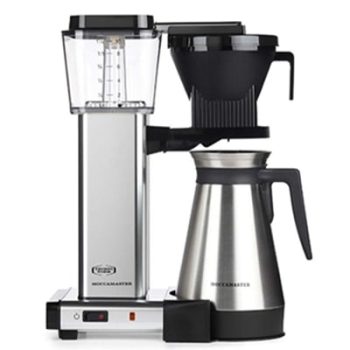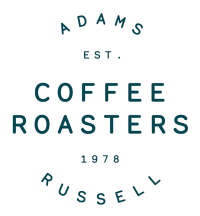
Filter coffee is one of the most popular forms of coffee available. It is a simple to produce drink that is used around the world in café’s, offices and other businesses for a fast and tasty customer beverage.
In this article we explore what filter coffee is, how to make it and what sets it apart from other types of coffee.
We’ll also look at where and when filter coffee is typically used and discuss a few complementary products.
What is filter coffee?
Filter coffee is the other major form of creating your favurite drink alongside espresso.
It is made by pouring hot water over ground, dried beans that are held in a filter to prevent the solid coffee grounds entering the drink.
Gravity pulls the water through slowly and vital oils, sugars and flavourful compounds are extracted from the ground beans to make a tasty liquid beverage.
Filter is usually smoother in flavour and weaker in caffeine content than espresso. It also takes longer to produce, but this can enable more complex flavour profiles to develop, suitable for different tastes.
Paper filters are very popular around the world. First invented in 1908 by a housewife in Germany, they help to reduce the bitter taste that dried, roasted and ground beans can cause.
Today there are many other forms of filters used, both disposable and permanent forms, and different kinds of containers for both brewing and serving filter coffee.
Some of the preparation equipment, such as the French press or cafetière, blur the lines a bit with filter coffee as the filtration isn’t carried out via gravity but by the user – but the principle is the same.
Who drinks filter coffee?
Filter coffee is popular in a wide variety of settings all around the world. People make millions of cups at home or at work every day and it’s sold in various different formats from normal shops and supermarkets.
Because of its simplicity to use, filter is also typically considered one of the best coffees for business environments, where companies need a fast and easy solution to impress clients and customers.
We stock blends to suit a range of tastes and from countries all around the world, and have seen them used in many different settings.
Filter coffee is a good solid choice for that first cup in the morning, due to its ease of use. You can purchase products, such as our Central American Filter blend, that come in readily weighed out sachets and with filters included.
And this makes it simple to brew up a cup.
How to make filter coffee
Making a fresh batch of filter coffee is a straightforward process – simply add the filter above the receptacle, pour in the ground beans and then slowly add hot water to infuse with the coffee.
In this process there can be a few variations however. The shape, depth and length of the machine’s percolated area can affect the drink’s strength and flavour, and in some drinks hot milk may be applied rather than water. The brewing time also varies.
You usually need more water and coffee grounds than for a cup of espresso, or any larger drinks that are based on espresso.
Opinions also differ on how to make best filter coffee at home. Some would recommend a standalone while others prefer a machine that handles the process for them.
If you’re considering how to use a machine for your daily cup, take a look at the type of flavours available first before deciding if this is the best option for you.
Some machine-made coffees can be perfect options (but remember you’ll need to clean the machine regularly!) whereas a simple drip-fed coffee might be the better option for your preferred flavour.
Our Fairtrade Colombian Filter for example offers a sweet and nutty flavour that is smooth to drink and goes well with different milks and foods. It is also provided with filters and in ready-made sachets so that there is no measuring to do.
Machine-ready filter pouches help to make the process of making your brew even easier.
The best beans for machines will stand up to the pressures and water temperature of the machine while maintaining a balanced flavour.
The best coffee beans for a filter machine
There’s no simple choice for the best beans for filter coffee. A wide variety of flavours and strengths are available from many different countries around the world that all work really well when prepared via a filter.
In general, lighter roasts work well as they are often not served immediately and has a longer time to brew (and strengthen by picking up caffeine) through gravity-fed drips.
In fact, some argue that the best ground filter coffee should always be drunk black due to the coffee’s potential strength and complexity.
Filter coffee is sometimes the cheapest drink on the menu due to its simplicity of production and ability to make in large batches that can keep for some time.
It is usually served with little to no milk so the flavours can be fully appreciated – but you can always add more of course!
The longevity of the beans is also an important factor to consider when selecting a product.
Filter coffee can often be made some time before it is drunk, so it needs to keep its flavour, strength and integrity for longer than beans used in espresso, which is made in small batches and consumed immediately
Our Superfine Vienna coffee for example is made with dried fig and a blend of high-quality beans, making it specifically designed to give a great flavour profile and balanced strength even when languishing in the pot for long periods.
Although caffeine strength is a key factor, you can also find decaf options.
Decaf filter coffee
Filter coffee is readily available in decaffeinated form in many different flavours.
The best decaf filter coffee is easy to use and gives a great taste even though the brew time can be long, which is typically associated with high-strength caffeinated coffee.
Decaf filter coffee is usually prepared in the same way as regular filter coffee, though some users prefer it to brew a little longer for the fuller flavour given that the beans are a little different from caffeinated versions.
Decaf coffee beans will have been roasted and packed for freshness so it will last a long time and give great tasting decaf cups when needed.
Choosing your favourite
As with most coffees, picking your favourite cup of filtered beverage is a tricky task!
The different blends, countries of origin, roasting conditions and strengths mean that there are all sorts of decisions to make – before you even choose whether or not to have milk.
The great thing about filter coffee is that because is it is so simple to make a larger batch, you’ll have plenty of opportunity to really judge the flavour in multiple cups.
Though do keep in mind that the flavour might evolve a little the longer a batch sits waiting for you to use it.
Best of luck finding your perfect cup. Remember to be patient and wait for that filter to work it’s magic – you won’t be disappointed!

